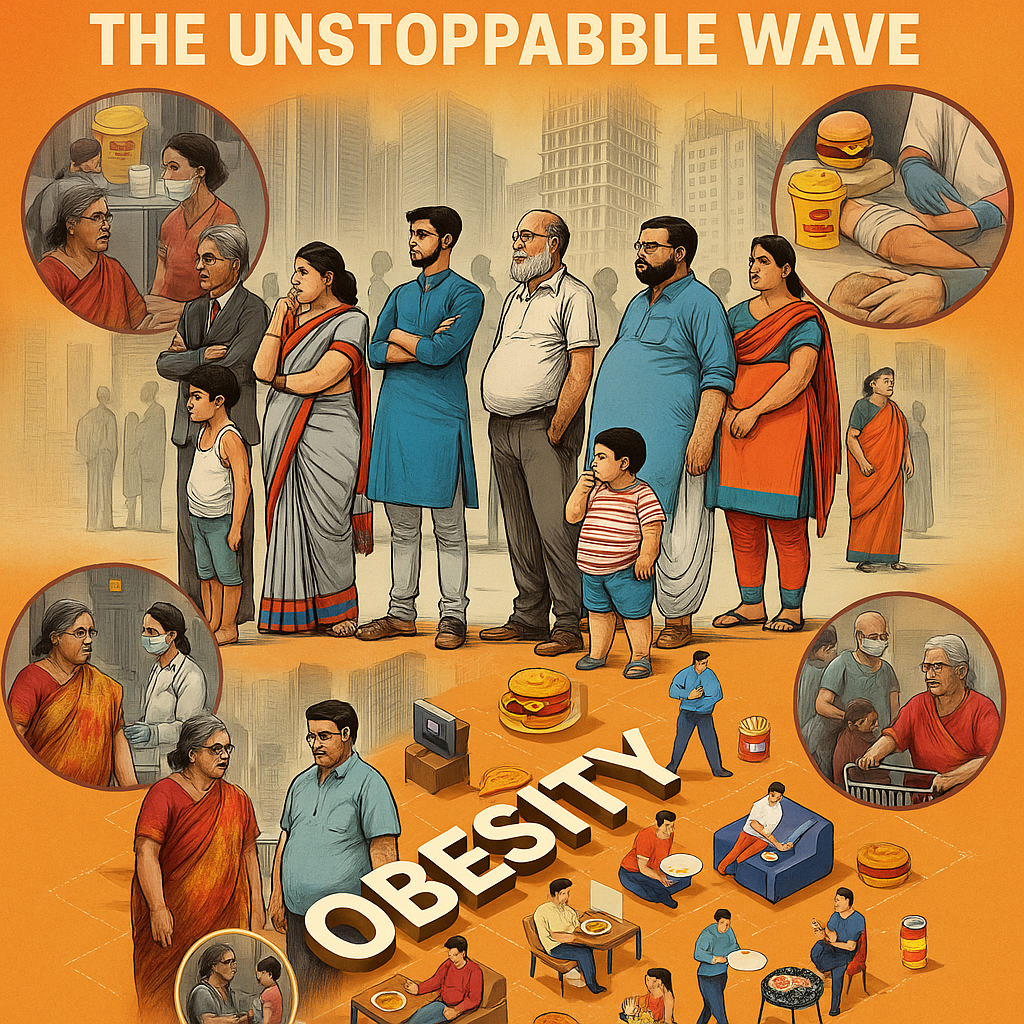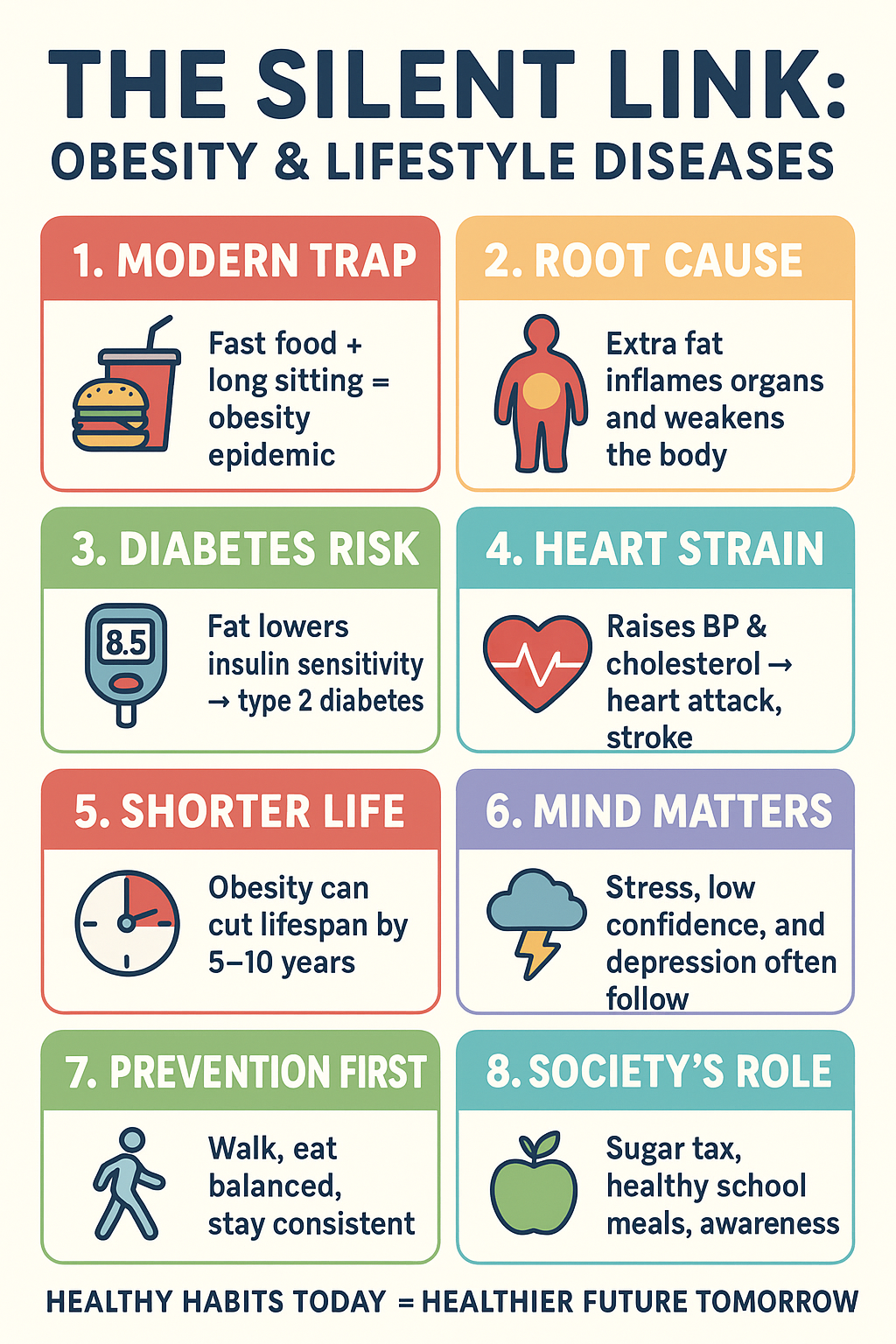By Nutriworld | Dt. Dipanwita Saha
The New Age Health Crisis:
Obesity is no longer just a “weight issue”—it’s the silent fuel behind many lifestyle diseases. With fast-food chains booming and office jobs keeping us glued to chairs, our waistlines and health risks are expanding. The World Health Organization (WHO) estimates that global obesity rates have tripled since 1975. This unstoppable wave is reshaping health, life expectancy, and economies worldwide.

Why Obesity is Rising Fast:
🍕Fast-Food Culture:
Convenience has replaced nutrition. Burgers, fries, and sugar-loaded drinks are cheaper, faster, and everywhere. But these foods are calorie-dense and nutrient-poor, pushing people toward weight gain.
💻Sedentary Jobs & Screen Time:
Desk jobs, binge-watching, and smartphones have drastically cut down physical activity. Even children today spend more time with screens than in playgrounds.
The Silent Link: Obesity & Lifestyle Diseases:
- Modern Trap – Fast food + long sitting = obesity epidemic.
- Root Cause – Extra fat inflames organs and weakens the body.
- Diabetes Risk – Fat lowers insulin sensitivity → type 2 diabetes.
- Heart Strain – Raises BP & cholesterol → heart attack, stroke.
- Shorter Life – Obesity can cut lifespan by 5–10 years.
- Mind Matters – Stress, low confidence, and depression often follow.
- Prevention First – Walk, eat balanced, stay consistent.
- Society’s Role – Sugar tax, healthy school meals, awareness.
- Hopeful Shift – Focus is shifting to sustainable habits, not just weight loss.

Science Speaks: What Research Shows:
Medical studies consistently link obesity to lifestyle diseases. For example, research published in The Lancet showed that every 5-unit increase in Body Mass Index (BMI) raises the risk of heart failure by 30%.
Similarly, the American Diabetes Association notes that 80–90% of type 2 diabetes cases are linked to excess weight.
Shifting Focus: From Weight Loss to Healthy Habits:
🥦 Diet & Activity Balance
Fad diets rarely last. Instead, nutrition experts recommend a balanced diet of whole grains, lean proteins, fruits, and vegetables paired with regular exercise.
[Note : A fad diet is a trendy eating plan that promises quick results but lacks balanced nutrition. It’s often unsustainable, risky long-term, and more hype than healthy habit.]
😴 Sleep & Stress Management
Poor sleep and stress hormones like cortisol can also fuel weight gain. Building healthier routines around rest is as important as diet.
Policy-Level Efforts & Global Debates:
💰 Sugar TaxSugar – Sweetened Beverages (SSBs)
Countries like Mexico and the UK introduced a “soda tax,” leading to a noticeable dip in sugary drink consumption. India and many others are debating similar steps.
🏫 School Food Reforms
From banning junk food near schools to promoting mid-day meal schemes, governments are working to shape healthier food habits in children.
While policies face pushback from industries, they remain crucial to tackling the obesity epidemic.
What You Can Do Today – Small Steps, Big Impact:
- Replace soda with water or fresh fruit juice.
- Walk for at least 30 minutes daily.
- Practice mindful eating—eat slower, chew well, avoid screens.
- Swap deep-fried snacks for nuts, fruits, or roasted seeds.
- Prioritize sleep and reduce late-night screen use.
Even one small change can ripple into long-term benefits.
Conclusion – Turning the Tide Together:
Obesity and lifestyle diseases may feel like an unstoppable wave, but small choices can rewrite the story. By focusing on balanced nutrition, physical activity, and supportive policies, we can protect future generations. Health is not about quick fixes—it’s about sustainable habits.
Remember: when individuals choose health, societies thrive. The power to change starts with the next bite and the next step.
FAQs
1. Is obesity only about overeating?
No. It’s a mix of diet, genetics, hormones, sleep, stress, and physical inactivity etc.
2. Can children also develop lifestyle diseases?
Yes. Childhood obesity is rising fast, leading to early diabetes and heart risks.
3. Do fad diets work for long-term weight loss?
Mostly fail. Sustainable changes in eating and activity are more effective.
4. How much exercise is enough?
Experts recommend at least 150 minutes of moderate activity per week.
5. Is obesity reversible?
Yes. With balanced diet, exercise, and lifestyle changes, many can reverse or control obesity-linked conditions.


